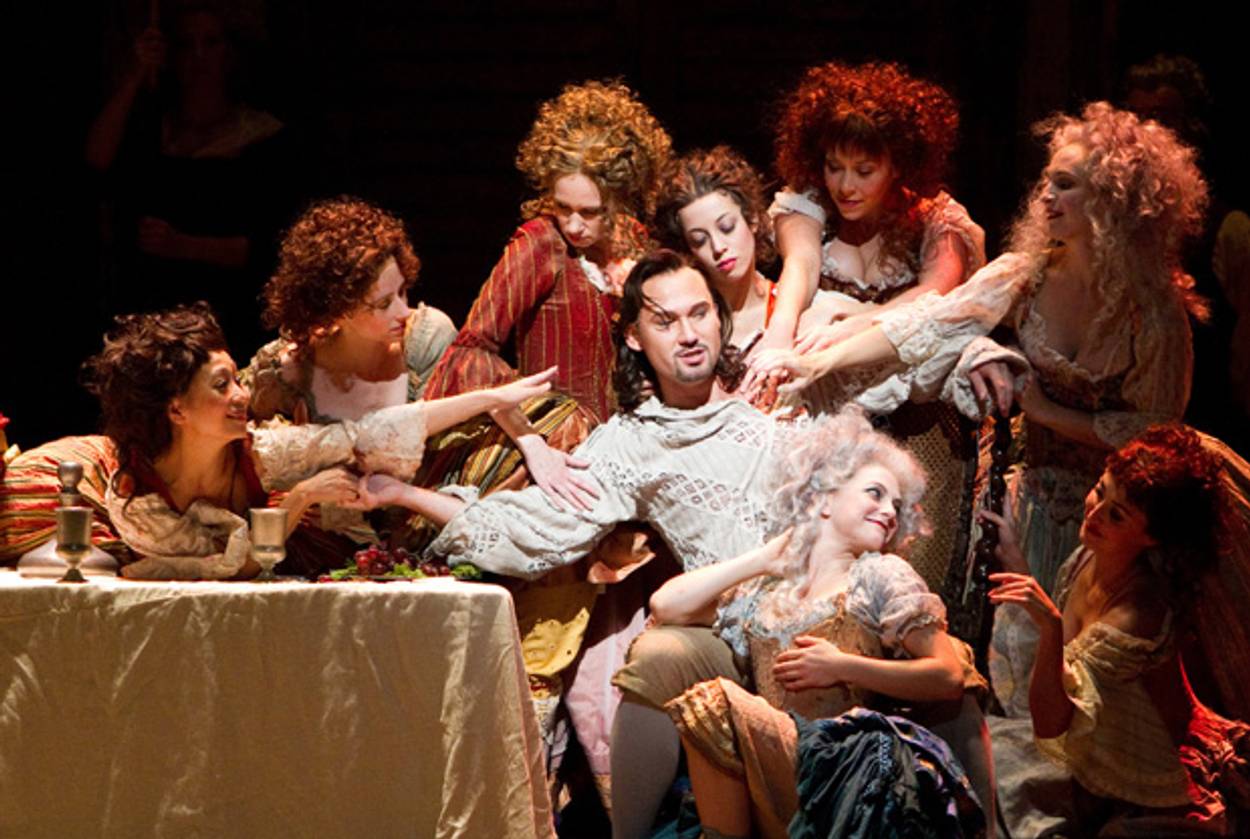Understudy
The new production of Don Giovanni at the Metropolitan Opera is well cast but marred by poor conducting




Don Giovanni is dragged down to hell at the conclusion of Mozart’s opera, and the new Metropolitan Opera production shows him sinking into a gap in the stage surrounded by shooting flames. It is the best send-off that Mozart’s protagonist has had in my experience, and it concludes a dramatically effective version with a strong and attractive cast. Sadly, Don Giovanni is a conductor’s opera, and the Met’s new principal conductor Fabio Luisi simply was not prepared to replace the ailing James Levine. The Met orchestra, one of the best in the world, sounded like a provincial Italian ensemble.
The Met is now the world’s premiere venue. It remains an oasis of tradition, which means that it tries to portray what composers had in mind, rather than what occurs to the clever young director of the moment. Michael Grandage, the trendy British director of the Met’s new Don Giovanni, offers no inappropriate innovations. Set designer Christopher Oram presents a realistic Spanish street scene on turntables that open to reveal a semi-circle. This allows for smooth scene changes and keeps the music going at a smart pace, a distinct service to musical continuity. For those who do not know the opera, the current Met version offers an excellent point of entry.
Mariusz Kwiecien, the Polish baritone, sang for the first time on October 25 after back surgery delayed his Met debut. He was worth waiting for. Unlike the suave Dons of the Met past—Ezio Pinza or Cesare Siepi—Kwiecien portrays Giovanni as a brute and rapist. That is entirely legitimate, although it leaves one perplexed as to what Donna Elvira saw in him. His well-produced voice lies on the lighter side of the bass-baritone spectrum. Luca Pisaroni portrayed a young and vigorous Leporello in place of the usual cringing buffo figure; that is a welcome change and makes his Act II impersonation of his master more credible.
The young Latvian soprano Marina Rebeka drew well-deserved cheers as Donna Anna. She is a great beauty and a convincing actress, but her voice portends an important career; it has both flexibility and dramatic brass. Barbara Frittoli’s now-notorious wobble made her first-act contributions almost unlistenable; by “Mi trade” in Act II, her voice was under control. It is a beautiful instrument plagued by poor technique. Ramón Vargas gave a flawless reading of Ottavio, and Mojca Erdmann and Joshua Bloom shone as Zerlina and Masetto.
In some ways, though, the evening recalled Faust more than Don Juan, for Fabio Luisi must have sold his soul to the devil to get the principal conductor’s job at the Met. Never in four and a half decades of attending the Met have I heard such a sloppy reading of a score, excepting Leonard Slatkin’s disastrous La Traviata in March 2010. Slatkin, the director of the Detroit Symphony and a conductor of high reputation, simply was unprepared; he also was temperamentally unsuited to Verdi. He had the good sense to withdraw from subsequent performances.
Only the most perfunctory applause greeted Maestro Luisi when he took his second-act bow. The Met audience loves to love Don Giovanni, but it showed no enthusiasm for Levine’s substitute. His troubles began with the Allegro section of the overture: His tempo was so rushed that the woodwinds would break in on the downbeat before the strings had finished the previous measure, literally colliding. That was not a one-off event; the same collisions occurred in the introduction to the second-act finale and the orchestral introduction to Elvira’s first-act aria, “A chi mi dice mai.”
The Met’s General Manager Peter Gelb might have been beguiled by Luisi’s tenure with the Vienna Symphony, the second-tier ensemble in Mozart’s city. Gelb may not be aware that the Viennese do not require a conductor to play Mozart. In 2002 I watched the first chairs of the Vienna Philharmonic’s string sections wrest control of the orchestra from a French guest conductor haplessly leading Marriage of Figaro and conduct the orchestra from their desks. James Levine made the Met into a great orchestra, but it isn’t yet ready to conduct itself in Don Giovanni.
In an interview published in the Met program brochure, Luisi said of Don Giovanni that “every note has meaning. It’s like Wagner that way.” Luisi’s reading of the score was a bit like Wagner, but in the way Rossini put it: a few good moments surrounded by awful quarter-hours.
David P. Goldman, Tablet Magazine’s classical music critic, is the Spengler columnist for Asia Times Online, Senior Fellow at the London Center for Policy Studies, and the author of How Civilizations Die (and Why Islam Is Dying, Too).
David P. Goldman, Tablet Magazine’s classical music critic, is the Spengler columnist for Asia Times Online, Washington Fellow of the Claremont Institute, and the author of How Civilizations Die (and Why Islam Is Dying, Too) and the new book You Will Be Assimilated: China’s Plan to Sino-Form the World.